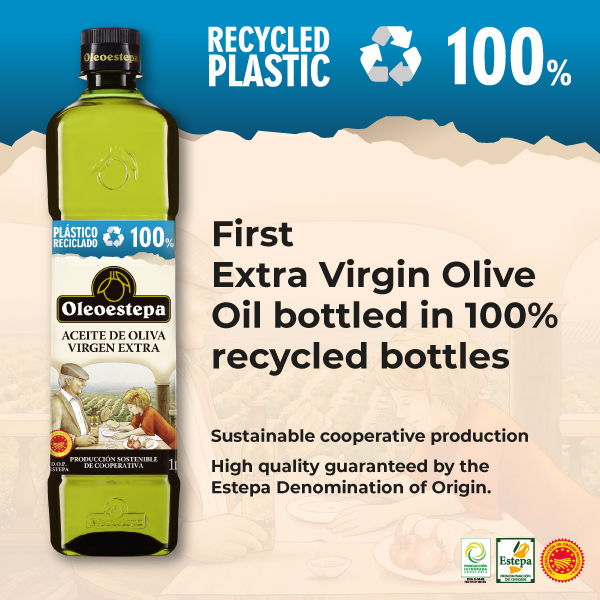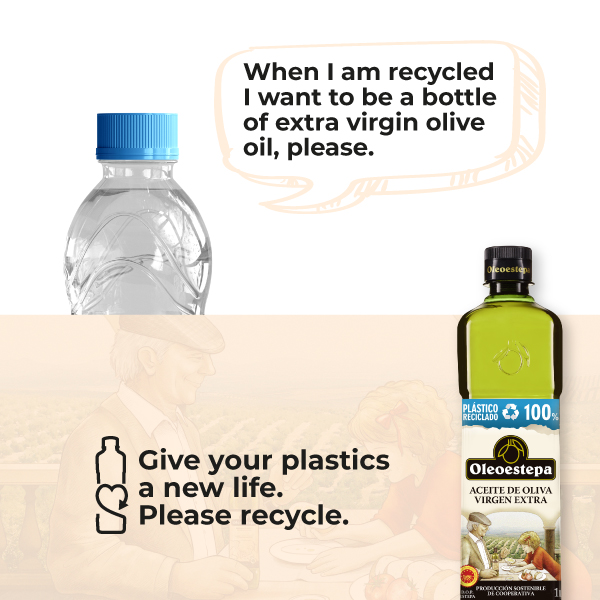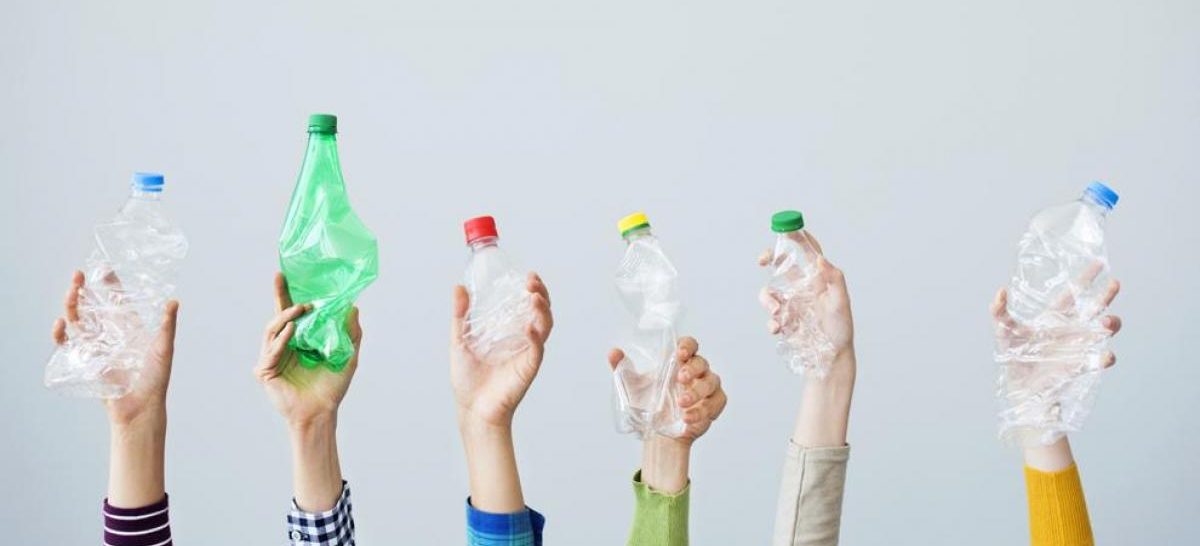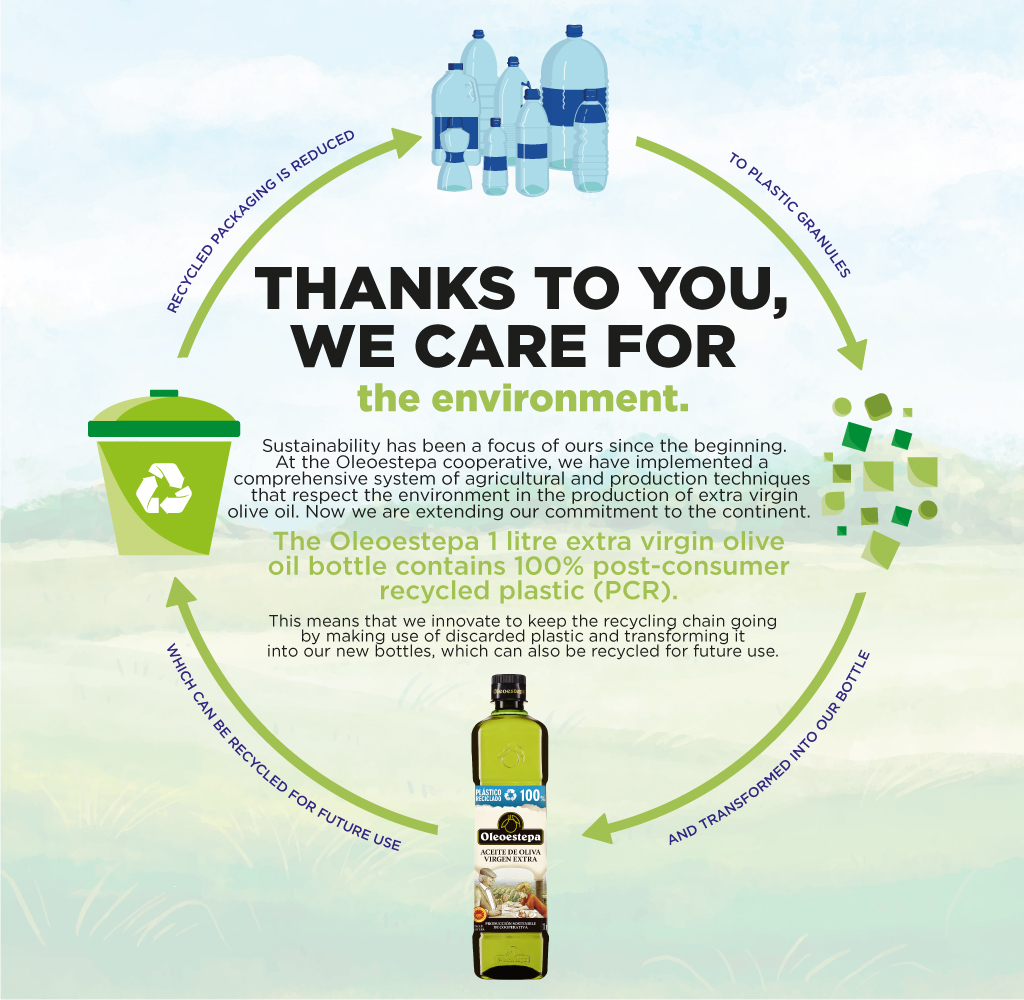
Since its beginnings, the Oleoestepa cooperative has been committed to excellence, sustainability and innovation.
Its content, extra virgin olive oil, is the result of environmentally friendly agronomic and production techniques, certified with the Integrated Production seal.
With the new 1-litre 100% R-PET bottle we go one step further. In line with our Corporate Social Responsibility and our strategic commitment to innovation, we present the first extra virgin olive oil in a 100% recycled plastic bottle.
New Oleoestepa extra virgin olive oil bottle made from plastic recycled from other plastic bottles.
Pioneers in sustainability. Inside and out.
Sustainable inside and out
Since its beginnings, the Oleoestepa cooperative has implemented integrated and organic production systems, a set of agricultural and production techniques that are environmentally friendly in order to obtain the highest quality oil, with all the guarantees of food safety and without sacrificing the productivity of the farm. This rational use of natural resources, especially water, prevents soil erosion, guaranteeing sustainable agriculture and a more livable planet.
From the consumers’ point of view, food produced and processed with these environmentally sustainable techniques is an excellent guarantee of food safety, quality and environmental sustainability, criteria that are becoming increasingly influential in their daily diet.
This environmental commitment on the inside is now also being extended to the outside, to its packaging. The new Oleoestepa 1 L R- 100% PET comes from used bottles. It has done so with its 1 litre format aimed at the mass market, with the aim of responding to the demands of an increasingly environmentally aware consumer. In addition, this new bottle includes the message “100% recycled plastic” to raise awareness of the importance of recycling.
Oleoestepa is working to increase the use of recycled plastic in its mass consumption range, so the new bottle will soon be accompanied by other formats such as 3 and 5 litres, as well as the 20 ml single-dose bottle.
This important innovation in the olive oil sector is part of the Oleoestepa cooperative’s commitment to use recycled materials in all its bottles, in a bid to give a second life to used plastics as part of a long-term circular economy.

The plastic waste problem: why we need action

While plastic has brought many benefits to modern society through its wide range of useful applications, it has also become a headache because of its harmful effects on the environment in general. Therefore, recycling and reusing plastic products should, by now, not only be an obligation, but a responsibility for all of us.
In this regard, in January 2018, the European Commission put forward a European strategy for plastics in a circular economy. While recognising that plastic is an important material which is ubiquitous in our daily lives and serves numerous functions, it also admits that it is often produced, used and discarded in huge quantities, and this does not benefit the environment.
Hence the need to abandon the traditional linear economic model of “use and throw away” and replace it with a more “circular” approach to this material to avoid the waste of millions of tonnes of used plastics.

In 2018, Oleoestepa set an ambitious target to help solve the problem of plastic packaging waste. The cooperative pledged to make all its packaging fully recyclable and to support the social movement in favour of plastic recycling.
This innovation meets the objectives set out in the sustainability variable of our Corporate Social Responsibility, being the first company in the olive sector to have AENOR IQNetSR-10 certification for our management of this issue.
Giving plastics a new life
 Given that well-managed PET packaging can once again become a resource, it is more necessary than ever to create a secondary market for recycled PET (R-PET) capable of meeting the demand of the food sector in terms of quantity and quality. Oleoestepa is therefore launching a parallel awareness campaign to give plastics a new life.
Given that well-managed PET packaging can once again become a resource, it is more necessary than ever to create a secondary market for recycled PET (R-PET) capable of meeting the demand of the food sector in terms of quantity and quality. Oleoestepa is therefore launching a parallel awareness campaign to give plastics a new life.
To make a new bottle of 1 litre R-PET Oleoestepa extra virgin olive oil, 3 plastic bottles need to be recycled. Hence the need to support the circular economy and the culture of recycling in the domestic environment. This is a task that, day by day, allows us to take care of the environment through sustainable projects such as the new Oleoestepa R-PET bottle.
This daily task of recycling in our homes is a basic part of the new circular economy, which advocates the optimisation of materials and waste, extending their useful life. This is a move away from the current linear ‘use and throw away’ system and towards an environmentally friendly system based on prevention, reuse, repair and recycling. This model makes it possible to extend the useful life of products and give them a second life.

Recycling and the circular economy: their role in the SDGs
The roadmap for sustainable development adopted by the international community, Agenda 2030, establishes the need to move the current model of production and consumption towards a circular economy, which implies doing more with fewer resources, less energy and less waste.
Among the Sustainable Development Goals (SDGs), number 12 seeks to ensure sustainable consumption and production patterns, and more specifically, to significantly reduce waste generation through prevention, reduction, recycling and reuse activities by 2030.
In order to achieve the sustainable and inclusive development advocated by the 2030 Agenda, recycling is configured as a great lever to promote sustainable production, consumption and lifestyles. Companies and cooperatives such as Oleoestepa are examples of the application of relevant innovations especially related to the circular economy.
But recycling is also an opportunity to establish alliances with other entities, both with organisations specialised in waste and with researchers, local communities or environmental organisations, which are essential to give meaning to the life cycle of products. Along these lines, the Oleoestepa cooperative has several projects underway to promote the culture of recycling and the circular economy. We invite you to follow our social media profiles and subscribe to our newsletter to keep up to date with the progress of these projects.


